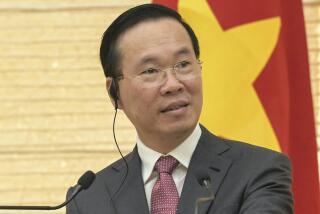China’s Leaders Launch New Drive Against Corruption
- Share via
BEIJING — China’s top leaders, seeking to stop a steady erosion of the Communist Party’s prestige, on Friday announced severe measures aimed at fighting high-level corruption.
Calls for stricter action against pervasive official corruption were among the most widely supported demands made at massive pro-democracy student demonstrations this spring.
In the wake of the bloody June 3-4 crackdown in Beijing that ended the protests, China’s leaders remain under intense pressure to reduce causes of public dissatisfaction.
Taking Aim at Luxury
The new rules, issued by the party Politburo and reported as the top item on the national television news, take aim at the luxurious life style of China’s Communist elite and the lack of financial accountability at state-run firms.
Anti-corruption drives have been launched repeatedly during the 1980s, and all have met with failure. But this attempt, coming in an atmosphere of political crisis, gives the appearance of being the most serious one yet.
This latest drive has at least three purposes: It is good public relations for the Communist Party and the government, it might help ease the very real problem of corruption and it provides a pretext for attacking people associated with recently ousted General Secretary Zhao Ziyang.
Corruption is so widespread in China--with reformers and hard-liners equally involved--that the issue can easily be used by those in power against their political enemies.
Hong Kong newspapers already have reported that one of Zhao’s sons, Zhao Erjun, is under investigation for alleged corruption as vice manager of a company on Hainan Island.
Some Cosmetic Measures
Some of the new measures are purely cosmetic and virtually impossible to monitor. High officials, for example, are supposed to stop receiving special supplies of high-quality foods. In the future, they are to “have the same ration and pay the same price as ordinary citizens do in getting foodstuffs supply,” according to the official New China News Agency.
But some other steps, if implemented, could have a significant impact on China’s economy and the situation of foreigners doing business in China. Some of the measures are supposed to take effect immediately, while others are to be enforced only after detailed regulations have been promulgated.
The Politburo decision calls for dismantling the China Kanghua Development Corp., a major trading company closely linked to Deng Pufang, one of senior leader Deng Xiaoping’s sons. Reports are to be published “as soon as possible” on audits conducted on this and four other state-owned corporations that are among the largest and most important in China, the New China News Agency reported.
The government will “further clean up and rectify companies with focus on closing the excessive commercial, foreign trade, materials supply and finance firms,” the agency reported.
Lack of Clear Rules
Tremendous opportunities for corruption are created in China by a lack of clear rules, lack of effective auditing and a two-tiered pricing system in which many goods circulate under administrative control at fixed prices but also are traded at much higher prices in free markets. In this environment, officials with the power to transfer controlled goods to free markets can reap immense profits.
China’s most reform-oriented economists and government leaders, including Zhao Ziyang, had generally hoped to lessen opportunities for corruption by moving forward with price reform to eliminate this two-tiered pricing system.
With China’s leadership shifting to a harder line politically and keeping price reform on hold, attempts to deal with the problem will now depend more on rules and investigations.
The Politburo decision bans the children or spouses of top officials from engaging in commercial activities.
“Those who are holding such posts must give them up before Sept. 1, 1989,” the news agency reported. “Leading officials are forbidden from abusing their power to provide conveniences for their relatives and friends in commercial activities.”
Several rules aim to bar activities that are widely seen as bordering on bribery. High officials are to visit foreign countries only on “business relevant to their positions,” the news agency reported. “None shall accept visit invitations from foreign businessmen or Chinese-funded firms based abroad.”
Members of the Politburo, the Central Committee Secretariat, which handles the party’s day-to-day administrative affairs, and the State Council, which is China’s Cabinet, are banned from using imported cars or entertaining guests other than foreigners at public expense.
“When going to subordinate units, they shall dine strictly according to relevant regulations and shall not accept gifts from subordinates,” the news agency reported.
It added that provincial and local governments were instructed by the Politburo to “work out their own specific stipulations” in line with the rules applying to top leaders.
More to Read
Sign up for Essential California
The most important California stories and recommendations in your inbox every morning.
You may occasionally receive promotional content from the Los Angeles Times.













